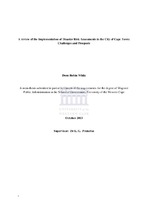| dc.contributor.advisor | Mphaisha, C. J. J. | |
| dc.contributor.author | Buwa, Mbulelo M. | |
| dc.date.accessioned | 2015-03-18T13:04:05Z | |
| dc.date.available | 2015-03-18T13:04:05Z | |
| dc.date.issued | 2012 | |
| dc.identifier.uri | http://hdl.handle.net/11394/4029 | |
| dc.description | Masters in Public Administration - MPA | en_US |
| dc.description.abstract | Greater capacity for cities to be disaster resilient is needed. Public-private partnership
enhances municipal capacity. This study therefore, interrogates the relationship between the
City of Cape Town and its disaster relief partners. It is mainly concerned with policy
implementation, and as such, investigates disaster management policy implementation in
relation to public-private partnerships.
The objectivesof the study were to provide a conceptual framework that defines the terms
eminent in the practice and study of disaster management, particularly those that characterize
public-private partnerships in the City of Cape Town; to explore the legislative mandate that
makes provisions for disaster management and the funding of public-private partnerships in
municipalities; to document the current practice of public-private partnerships in the City of
Cape Town; to highlight noted challenges in the partnership and where necessary,
recommend alternative policy implementation options for enhanced partnership sustainable
capacity for disaster relief.
The researcher deemed it expedient to utilize the qualitative method for the purposes of the
adeptness it affords in expediting malleable, arduous investigation in engaging with the
phenomena that “unfold[s] in real-world situations.”
As far as the findings of this study are concerned, the public-private partnership of the City of
Cape Town with its disaster relief partners is a successful one. It is effective in bringing the
much needed awareness and relief to devastated communities. There are four main
challenges that impact on this disaster relief partnership have been realized by this study. These namely are the delays in the reimbursement process, the constant change of
government personnel dealing with relief partners, absence of a disaster relief official on the
sites of distress and unsubsidized expenses incurred by the relief partners. Having realized
these challenges, the study makes policy implementation recommendations. | en_US |
| dc.language.iso | en | en_US |
| dc.publisher | University of the Western Cape | en_US |
| dc.subject | City of Cape Town, Disaster, Disaster risk management, Disaster risk reduction, Disaster Risk Management Centre, Vulnerability Hazard, Public Private Partnership, Non-profit organizations, Relief | en_US |
| dc.title | Public-private partnerships in disaster management: A case-study of the city of cape town | en_US |
| dc.title.alternative | A mini-thesis submitted to the School of Government, Faculty of Economic and Management | en_US |
| dc.rights.holder | University of the Western Cape | en_US |




